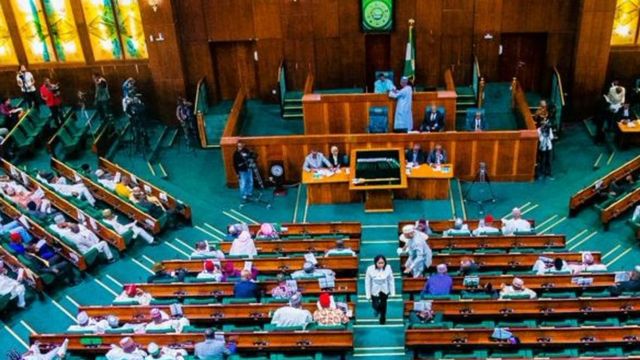House of Representatives, on Tuesday, passed through Second Reading a bill which seeks to introduce new excise collectable revenue, legalise levy on carbonated drinks as well as regulate the appointment of Comptroller General and other employees of Nigeria Customs Service (NCS).
The private member bill sponsored by Hon. Leke Abejide seeks to repeal the Nigeria Customs and Excise Management Act, Cap C45, Laws of the Federation of Nigeria, 2004, and to enact an Act to establish the Nigeria Customs Service Act, 2021.
In his lead debate, Hon Abejide, who underscored the urgent need for a holistic overhaul of current Customs and Excise legislation in view of its contribution to fiscal and national policy development.
“Since 1958, more than half a century ago, the Nigeria Customs and Excise Management Act has not undergone any major reform. You will agree with me that in today’s competitive world, the Act, its Regulations, and its Operational Guidelines are archaic, obsolete, and no longer in tandem with modern-day challenges, and this has unfortunately reduced measurably the accruing revenue against the volume of trade.
“This exercise is noticeable in the following areas: Collation of all Customs and Excise Legislations into a single compendium of Customs and Excise Act to facilitate easy reference and easy knowledge-driven Customs and Excise policies.”
According to him, the proposed bill seeks to “position the Nigeria Customs Service to be financially stable in order to recruit the required number of Officers they need to man our porous border stations. The Nigeria Customs Service recently have 15,349 officers instead of 30,000 officers needed for the Service to function optimally. The current 7 per cent cost of collection from Duties payment is not enough to pay salaries of officers, not to talk of improving the infrastructures. For this reason, this bill provides for an additional funding system based on 4 per cent FOB, according to international best practice, to address funding problems, and to reposition the Service for improved efficiency and service delivery.”
In the bid to ensure strict compliance to the proposed legislation, the bill provides for “stiffer punishments for offenders to act as deterrence for serious economic crimes of Customs and Excise oriented, thereby encouraging more revenue in the area of fine payment.
“Provision of legislative input into the appointment of Comptroller General of Customs and Excise similar to other organizations like Inspector General of Police and Service Chiefs. This is based on the economic importance and security implication the occupier connotes to the national development.”
The bill further seeks the “rejigging the Board of Customs and Excise Management with competent and result oriented technocrats for smooth and fast operation of its functions, putting round pegs in round holes.
“Provisions in line with international best practice with realistic deviation from the 1958 Act that has become obsolete in injecting combative approach to revenue generation.”
“Boosting the morale of Customs Officers with incentives introduced to carry them along in the scheme of things from the Comptroller General down to the last employee of the service in line with revenue generation institutions and service delivery mechanism; and introduction of new Excise collectable revenue avenues in line with the just recently enacted Finance Act 2020 for smooth operation.
“The collection of Excise Duties on all carbonated drinks is now captured in this Bill for the Nigeria Customs Service to have adequate legal backing to function in this area.”
He expressed optimism that the proposed amendments are “sufficient to implode economic development and greater revenue generation in tandem with the goal and target given to the Nigeria Customs Service in view of fiscal independence and autonomy our economy is yearning for.
“The most innovative inclusion into the Bill is the objectives of eradicating problems of corruption, fraud and malpractices together with inefficiencies and ineffectiveness in the operation of the service, which has hindered the desire to contribute maximally to the economic development of the nation.
“Furthermore, the injection of provisions driven from stakeholders advise and experiences shall bring measures to eradicate fraud and smuggling activities for the full collection of revenue due, timely from Customs and Excise duties.
“In accomplishing this task this Bill is in tune with ICT development, thereby giving the Service the ICT demand it requires for its operations in line with international best practice. This would ensure a model that can think a thousand times faster and more efficiently than humans do, this digitalization of Nigeria Customs Service with
the already embraced innovative solutions to trades across emerging markets. As a result of this, Nigeria Customs Service may record higher revenue in 2022.
“For improvement and diversification of Nigeria major source of revenue from oil to non-oil sectors, this Bill must be quickly activated and urgently put in use when passed.
“The re-orientation of the Customs Service in line with mechanism or methodology of improving their skill and knowledge in order to eradicate tax evasion and tax avoidance of the operators in the system must be quickly enhanced.
“Finally, the government needs to fully implement the various reforms so that various loopholes that serve as conduit pipes for free flow of revenue to individual hands can be blocked. Corruption and fraud need to be checked in the system,” Hon Abejide stressed.
To this end, the bill was referred to the House Committee on Customs and Excise for further legislative action.
YOU SHOULD NOT MISS THESE HEADLINES FROM NIGERIAN TRIBUNE
FALSE! Yoruba Not An Official Language In Brazil
Claim: A national newspaper and multiple online platforms claim Brazil has adopted Yoruba as its official language and that the language would be included in primary and secondary schools curriculum.
Verdict: The claim is false. The content of the article published by these online platforms is not new; it has been recirculated several times and has been debunked.
Customs: Reps propose new excise collectable revenue, legalise levy on carbonated drinks






